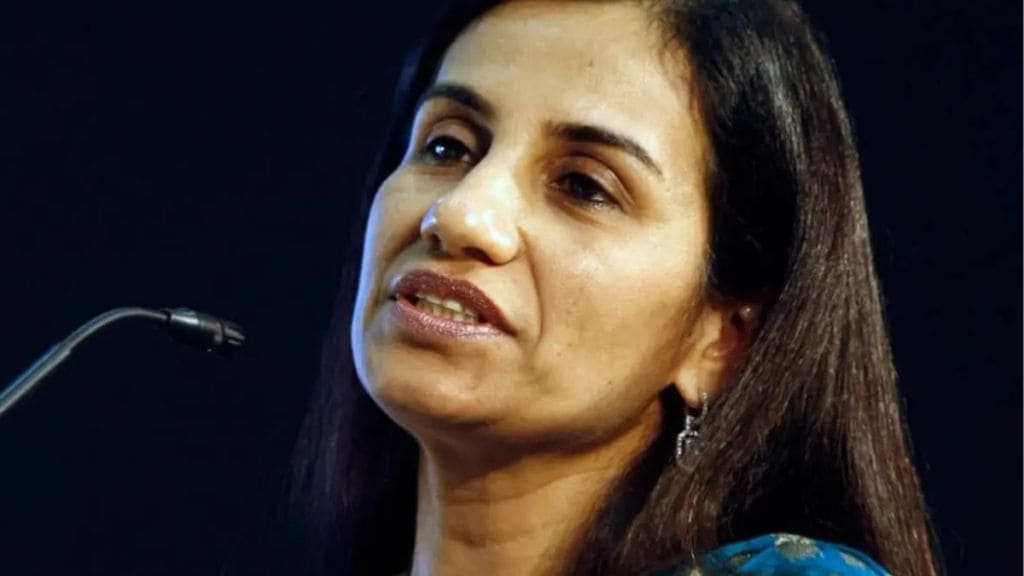The arrest of former ICICI Bank MD & CEO Chanda Kochhar and her husband, Deepak, by the Central Bureau of Investigation (CBI) on Friday has brought the focus back on the cash-for-loan fraud that shocked banking circles six years ago.
The list of accolades in Kocchar’s kitty is long. And so is the list of allegations against her.
On one hand, there is a Padma Bhushan — India’s third-highest civilian honour — making it to Fortune magazine’s list of the ‘Most Powerful Women in Business’ for five consecutive years and to Time magazine’s ‘100 most influential people in the world’ in 2015.
On the other are six cases in a cash-for-loan scam and, of course, the ignominy of being arrested.
A graduate of the Jamnalal Bajaj Institute of Management Studies, where she met her husband, Kochhar was the first woman to head a systemically important bank. She took charge of ICICI Bank amidst the collapse of US investment bank Lehman Brothers, which triggered the global financial crisis in 2008-09, and turned it around even if that meant shrinking the balance sheet size in her initial years. Moving away from the growth mindset of several years to one of capital conservation with profitability wasn’t going to be easy, but Kochhar handled it well.
But the fairy tale ended abruptly, and how. India’s youngest bank CEO (at 47), who was in charge of the bank for a decade till her services were terminated in 2019, has seen things crumble around her in the past four years.
Murmurs of fraud started as early as October 2016, prompting the Reserve Bank of India (RBI) to investigate the matter. But things soon went quiet.
It was only in 2018 when the real action began. An anonymous whistleblower made allegations against Kochhar and the ICICI Bank management.
Soon, agencies like the CBI and Serious Fraud Investigations Office (SFIO) swung into action and the Securities and Exchange Board of India (Sebi) issued Kochhar a show-cause notice. ICICI Bank’s board initially backed her, but soon set up an independent probe under a committee headed by retired Supreme Court Justice BN Srikrishna.
Under pressure from various quarters, Kocchar opted for premature retirement. Within months, however, the bank’s independent probe concluded that Kocchar had violated the code of conduct while sanctioning the loans in question. The board decided to treat her stepping away from the bank as ‘termination for cause’.
The cash-for-loan fraud
The CBI has alleged that Kocchar was on the bank’s committee which sanctioned loans to Videocon Group owner Venugopal Dhoot’s companies while her spouse Deepak had business relations with them. Six loans worth ₹1,875 crore were sanctioned by ICICI Bank to Videocon and its associated companies between 2009 and 2011, when she was heading it. Almost all the loans became non-performing assets, causing a loss of ₹ 1,730 crore to the bank. More loans were extended to the group later.
The bureau claimed she abused her official position and “got illegal gratification/ undue benefit through her husband from Dhoot for sanctioning loans to Videocon”.
Kocchar has refuted the allegation. “I reiterate that none of the credit decisions at the bank is unilateral … the organisation design and structure obviate the possibility of conflict of interest,” she had said in a statement.
It is alleged that Deepak’s NuPower Renewables received funding of ₹64 crore — via a maze of shell companies — from Videocon Group. This came only weeks after the group was granted a ₹3,250 crore loan from ICICI Bank.
The allegation is that Dhoot, as quid pro quo, made the investment in NuPower Renewables through Supreme Energy (SEPL) and transferred SEPL to Pinnacle Energy Trust, managed by Deepak, through an indirect route.
What lies ahead
ICICI Bank has managed to disassociate itself from its once feted CEO and stem the damage to its image. But Kochhar’s arrest comes at a time when regulators and even finance minister Nirmala Sitharaman are pushing for more women directors on boards of companies.
Like Chitra Ramkrishna (of National Stock Exchange notoriety), Kochhar was widely acknowledged as one of the few women in India Inc to break the glass ceiling.
While various investigating agencies are still probing the cases against them, the damage has been immense. Kochhar’s fall, and that of Ramkrishna, has come as a disappointment to several young women professionals looking for role models in their trek to the top.


